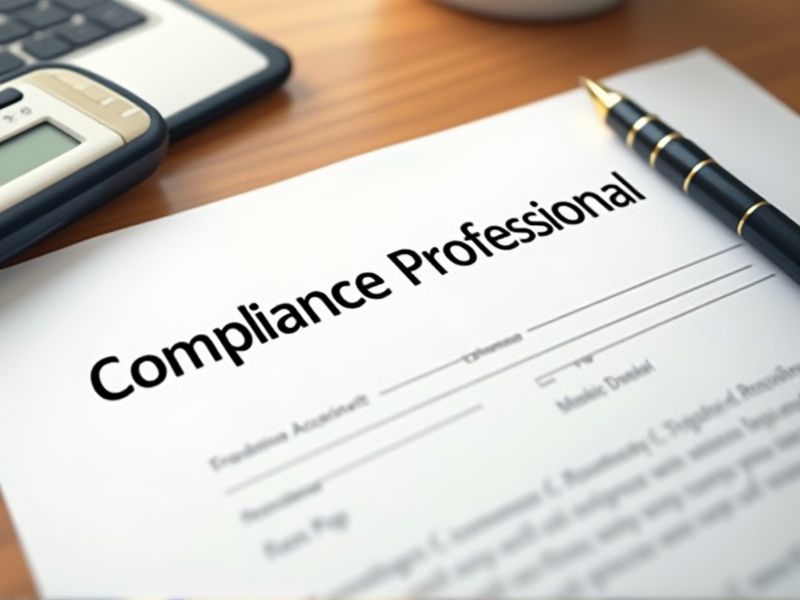
A Compliance Professional operates in a field heavily regulated to ensure adherence to laws and policies. Obtaining specific certifications enhances an individual's ability to navigate complex legal environments and address regulatory demands effectively. Certifications validate expertise, build credibility, and offer a competitive advantage in current job markets. Here are some essential certifications that could be crucial for a Compliance Professional.
Certified Compliance & Ethics Professional (CCEP)
The Certified Compliance & Ethics Professional (CCEP) credential validates a professional's expertise in compliance standards and ethical practices, establishing reliability and trustworthiness in the field. Companies prioritize hiring CCEP-certified individuals due to their proven ability to navigate complex regulatory environments and mitigate legal risks. This certification enhances a professional's skills in designing and implementing effective compliance programs, which is crucial for maintaining organizational integrity. Data indicates that professionals with certification often see improved career advancement opportunities, as employers recognize their commitment to maintaining ethical governance.
Certified Regulatory Compliance Manager (CRCM)
The role of a Certified Regulatory Compliance Manager (CRCM) validates a professional's expertise in navigating complex financial regulations, which enhances trust among clients and stakeholders. Earning the CRCM certification requires a deep understanding of various regulatory frameworks, enabling compliance professionals to effectively mitigate legal and financial risks. Organizations benefit from employing CRCM-certified individuals as they are equipped to handle audits and regulatory inquiries with confidence and precision. The rigorous training and examination process for the CRCM ensures that certified professionals possess the necessary skills to adapt to the ever-evolving regulatory landscape.
Certified Anti-Money Laundering Specialist (CAMS)
The rise in global financial crimes has increased the demand for professionals proficient in anti-money laundering protocols. Obtaining a Certified Anti-Money Laundering Specialist (CAMS) designation equips compliance professionals with the essential knowledge to effectively identify and mitigate money laundering activities. Regulatory bodies worldwide recognize and trust the CAMS certification, ensuring that professionals are well-versed in current laws and practices. Holding a CAMS certification can lead to enhanced career opportunities and credibility in the compliance sector.
Certified Information Privacy Professional (CIPP)
Organizations face increasing regulatory requirements to protect personal data. A Certified Information Privacy Professional (CIPP) provides a comprehensive understanding of global privacy laws, ensuring compliance. The credential demonstrates a professional's ability to design and implement robust data protection strategies. As a result, it mitigates risks and safeguards an organization's reputation.
Certified in Risk and Information Systems Control (CRISC)
Compliance professionals are required to navigate complex regulatory environments, and CRISC provides them with the advanced skills to effectively identify and manage IT and business risks. This certification arms them with the knowledge to directly develop and implement risk management strategies that align with compliance requirements, thereby minimizing potential legal issues. With CRISC, compliance professionals can enhance organizational resilience by embedding risk management into the core business processes. Organizations increasingly demand CRISC-certified professionals to ensure a robust risk management and compliance framework, which directly amplifies job prospects and career growth in the compliance sector.
Certified Fraud Examiner (CFE)
Fraud detection and mitigation significantly enhance when a Compliance Professional holds a Certified Fraud Examiner (CFE) credential, due to their specialized training in recognizing and preventing fraudulent activity. The credential equips them with skills to anticipate and identify vulnerabilities in compliance systems, reducing illegal practices. Understanding fraud's multifaceted nature, CFEs contribute valuable insight into internal controls and company policies. Besides enhancing organizational integrity, the CFE designation boosts a compliance professional's credibility and capacity to enforce regulations effectively.
Certified Risk and Compliance Management Professional (CRCMP)
Compliance professionals face complex regulatory environments. CRCMP certification provides a structured understanding of risk and compliance frameworks. This certification enhances credibility, making professionals more competitive in the job market. Trained individuals are better equipped to implement effective compliance strategies and reduce organizational risks.
Certified Healthcare Compliance Professional (CHCP)
The Certified Healthcare Compliance Professional (CHCP) certification establishes a recognized standard of expertise for compliance professionals, ensuring they are equipped to navigate complex regulatory frameworks within healthcare. Having CHCP credentials demonstrates a commitment to maintaining ethical standards and reduces the risk of legal issues for healthcare organizations. Compliance professionals with this certification are better prepared to implement effective compliance programs, boosting organizational efficiency and trust. Employers benefit from hiring CHCP-certified individuals as it enhances their credibility and reduces potential liabilities.
Certified Data Privacy Solutions Engineer (CDPSE)
Organizations face escalating regulatory demands, and a Certified Data Privacy Solutions Engineer (CDPSE) helps ensure compliance by expertly designing data protection measures. The CDPSE certification equips professionals with technical skills that align with various privacy laws and standards, reducing risks of non-compliance penalties. With breaches becoming more frequent, having a CDPSE aids in identifying vulnerabilities and implementing robust security practices. Certified professionals contribute to building customer trust by assuring stakeholders their data privacy is actively safeguarded.
Certified Global Sanctions Specialist (CGSS)
Increased global scrutiny on international financial transactions leads to a higher demand for compliance professionals with specialized knowledge, thus the need for Certified Global Sanctions Specialists (CGSS) arises. Changes in global sanctions laws and regulations require compliance teams to stay updated, making CGSS vital for ensuring organizational adherence. Complex multinational operations face diverse sanctions regimes, and professionals with CGSS certification offer valuable insights into risk mitigation. A CGSS credential empowers compliance professionals to navigate and interpret sanctions effectively, enhancing their role within regulatory frameworks.
Summary
When you obtain certifications as a Compliance Professional, your credibility and expertise in the field are likely to increase. This enhanced reputation can lead to more job opportunities and potential career advancement. Employers often prefer or require certified professionals, making you a more competitive candidate in the job market. Furthermore, specialized certifications can equip you with the knowledge to navigate complex regulatory environments effectively.
